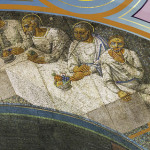We run our website the way we wished the whole internet worked: we provide high quality original content with no ads. We are funded solely by your direct support. Please consider supporting this project.
How do you respond to Ezekiel 26:1–21?
There are a number of specific prophecies against various cities in the Old Testament which were fulfilled (though some were not, see Jer. 18:6–10). The Lord’s prophecy against Tyre is one of the most impressive. The Lord says Nebuchadnezzar will ravage the seaport (vs. 7–11) and tear down all the buildings and throw the rubble into the sea (vs. 12–13, 19). Tyre will ultimately be made into “a bare rock, and…will become a place to spread fishnets.” It “will never be rebuilt” (vs. 4) and will, in fact, never again be found (vs. 21).
Not everything spoken of in this verse was fulfilled in the siege of Nebuchadnezzar. It was ultimately fulfilled by Alexander the Great more than two hundred years later. He pushed what little was left of Tyre after Nebuchadnezzar’s devastating siege into the sea as a means of building a land bridge to the island off the coast of the old city. Since he did not have a naval fleet, Alexander needed a way to reach and conquer the inhabitants of this small island where the old seaport used to thrive. The location now is indeed “a bare rock” with only a few small fishing villages to boast of. And you can guess where they spread their nets to dry!
Amazing prophecies like this demonstrate that Yahweh is the one true God and help prove that the Bible is his inspired Word. They exalt God’s sovereign control over world history and his unfathomable wisdom in using the plans of people to accomplish his own objectives. But we undermine the full magnitude of this divine wisdom if we reduce such prophecies to “crystal ball” previews of the future. A God who can creatively weave the free decisions of people as a means of carrying out his providential plan is greater than a God who needs to have everything settled ahead of time to carry out his plan.
In my estimation, as Alexander the Great was planning his campaign in this region, the sovereign Lord of creation was seizing this opportunity to fulfill the prophecy against Tyre he had given two centuries earlier. How much or how little supernatural intervention it may have taken for the Lord to ensure that Alexander the Great would fulfill these prophecies is uncertain. But if he had to influence him at all, there is no reason to think that he had to do it against the vicious character this king had already freely acquired. God is so shrewd he can use the wickedness of people’s hearts to accomplish his own ends (Gen. 50:20).
Of course, had the king and the people of Tyre repented of their sin, it might have been that none of this prophecy would have come to pass (see Jer. 18:7–10). If so, this prophecy against Tyre would have been understood along the same lines as the Lord’s canceled prophecies against other cities and nations who repented. The conditions would have been met to change God’s mind about Tyre’s decreed destruction.
Category: Q&A
Tags: Open Theism, Q&A
Topics: Open Theism, Responding to Objections
Verse: Ezekiel 26
Related Reading

What is the significance of Exodus 33:1–3, 14?
“The Lord said to Moses, ‘Go, leave this place, you and the people whom you have brought up out of the land of Egypt, and go to the land of which I swore to Abraham, Isaac, and Jacob…I will send an angel before you, and I will drive out the Canaanites…Go up to the land…

Does The Open View Limit God?
Suppose you and I both agree that God is omniscient and thus knows all of reality, but we disagree over, say, the number of trees on a certain plot of land. I say there are 1,300 and you say there are 2,300. You wouldn’t say that I am limiting God because he knows fewer trees…

The Open View of Messianic Prophesies
Image by Lawrence OP via Flickr A number of passages speak of particular events being foreknown by God, even events resulting from individuals’ free will. For example, dozens of prophesies in the OT accurately predict details about the coming Messiah (e.g., he would be born in Bethlehem; arise out of the lineage of Abraham; be executed with…

How do you respond to Matthew 16:21?
“From that time on, Jesus began to show his disciples that he must go to Jerusalem and undergo great suffering at the hands of the elders and chief priests and scribes, and be killed, and on the third day be raised.” The ministry and death of Jesus are the centerpieces of God’s plan in world…

What is the significance of 1 Samuel 2:27–31?
Because Eli “scorned” God’s sacrifices and did not punish his sons for their vile behavior, the Lord says, “‘I promised that your house and your father’s house would minister before me forever.’ But now the Lord declares, ‘Far be it from me! Those who honor me I will honor, but those who despise me will…

How do you respond to Romans 11:36?
“For from him [God] and through him and to him are all things.” Calvinists sometimes cite this doxology as evidence that Paul believed that every single event in world history was from, through and for God. In light of the fact that the verses leading up to this doxology address God’s genuine frustration with Israel’s…
